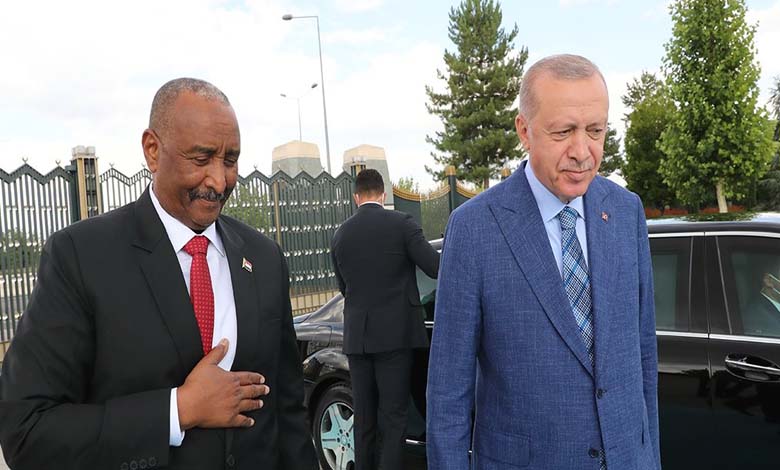Al-Burhan’s Visit to Turkey: Could It Bring Islamists Back into Sudan’s Political Scene?

On March 30, 2025, Sudan’s Sovereign Council President, General Abdel Fattah al-Burhan, made an unannounced trip to Turkey to meet with his family for the Eid al-Fitr holiday. This visit comes at a delicate time, as Sudan faces complex political and military developments. While seemingly personal, the visit carries significant political weight, especially with al-Burhan scheduled to attend an economic conference in Antalya, Turkey, on April 15, 2025.
-
Turkey’s Support for Al-Burhan: Signs of a New Crisis or Strategic Cooperation?
-
Fueling the War in Sudan: Iran Qatar and Turkey in the Eye of the Storm
Attempts to Reinstate the Former Regime
According to informed sources, al-Burhan used his visit to Turkey to hold meetings with leaders of the former regime who enjoy support from certain political and economic circles in Ankara. These discussions focused on ways to bring back figures from the former regime, particularly those from the Islamist movement, into the Sudanese political scene amid a deep political crisis following the ousting of President Omar al-Bashir.
These meetings aim to revive the role of the Islamist current in Sudan, especially as regional and international pressure mounts on the current Sovereign Council. Al-Burhan is reportedly seeking political and economic backing that could help him preserve his influence.
-
Turkey Supplies Drones and Weapons to Sudanese Army, Used to Kill Civilians and Displace Them
-
The gold alliance between Sudan and Turkey: Political and Economic Exchange
Promises and Investments in Exchange for Turkish Support
Reports suggest that al-Burhan offered Turkey investment projects and economic opportunities in return for political support to facilitate the return of former regime figures to power. Turkey, which maintains close ties with the Muslim Brotherhood, seeks to strengthen its influence in Sudan, taking advantage of the country’s deteriorating economic situation.
Turkey has long been a safe haven for Sudanese Islamist leaders since al-Bashir’s fall. Some were granted Turkish citizenship and continue their political and media activities from there. Any rapprochement between al-Burhan and these figures could signal a reshaping of Sudan’s political landscape in line with Ankara’s regional interests.
-
Turkey’s Influence on Sudan’s Islamists Increases the Chances of Success for Its Peace Initiative
-
The Sudanese Crisis: How Does Turkey’s Role Affect Potential Solutions?
Return of the Muslim Brotherhood to Sudan?
One of the key issues discussed during al-Burhan’s visit to Turkey was reportedly the potential return of Muslim Brotherhood leaders to Sudan. Al-Burhan is said to be seeking to include some Islamist elements in a future government as part of an effort to forge new political alliances that would ensure his survival in power.
However, this move is likely to spark controversy within Sudan, where the Islamist movement faces strong opposition from civil political forces and some regional powers opposed to their return. Nevertheless, al-Burhan may see this alliance as a strategic opportunity to strengthen his position amid an intensifying struggle for power.
-
The Sudanese Crisis Grows More Complex: How Is Turkey Shaping the Scene?
-
Turkey’s Support for Al-Burhan: Signs of a New Crisis or Strategic Cooperation?
Implications of the Visit on Sudan’s Political Scene
These developments raise serious questions about the future of governance in Sudan and al-Burhan’s ability to balance international pressure with the need to build domestic alliances. Any potential agreement with Turkey to bring back former regime figures could reignite political tensions and deepen instability in the country.
Meanwhile, Sudan’s opposition may seize this moment to increase internal pressure on al-Burhan, especially if evidence emerges of deals aimed at restoring Islamists to power.
In this uncertain context, al-Burhan’s visit to Turkey remains shrouded in ambiguity. Though officially a family visit, it may well signal a decisive political turning point. The key question remains: Will al-Burhan succeed in reshaping Sudan’s political landscape through these new alliances, or will his maneuvers further deepen the country’s divisions and conflicts?












